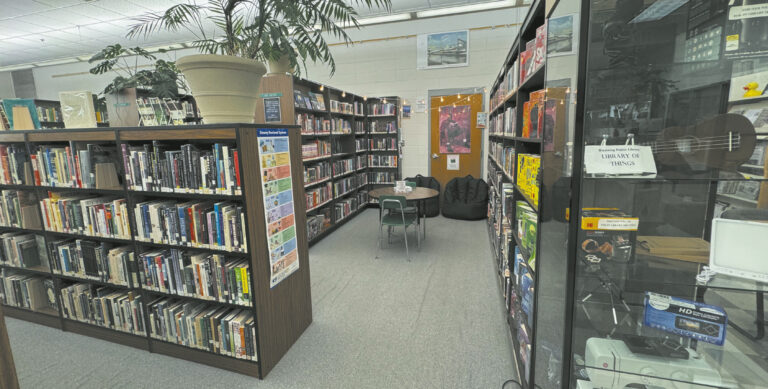Editor’s note:
This is the second installment in a twopart series examining the potential fallout of proposed federal cuts to the Institute of Museum and Library Services. Part 1 was published in the June 6 issue of The Beacon.
President Donald Trump on March 14 issued Executive Order 14238, which directed the elimination of seven federal agencies, including the Institute of Museum and Library Services.
Trump’s fiscal year 2026 budget proposal slashed IMLS funding to $6 million — a figure budgeted solely to shut down the agency’s operations.
The order sparked swift legal action. Michigan joined 20 other states in a lawsuit challenging the constitutionality of the move. In May, a federal judge issued a preliminary injunction restoring IMLS staffing and grant making in the plaintiff states.
A second injunction, the result of a separate lawsuit filed by the American Library Association and the American Federation of State, County and Municipal Employees, further blocked the shutdown nationwide. Both lawsuits are ongoing, and the Trump administration has filed appeals.
Meanwhile, the legislative authority for IMLS is set to expire Sept. 30 unless Congress reauthorizes the agency. For many Michigan library leaders, the uncertainty is destabilizing.
Dillon Geshel, director of the Superiorland Library Cooperative, said the legal limbo surrounding IMLS funding has left local institutions in a holding pattern.
“We’re in a weird space right now,” he said. “We’ve been told we can move forward with grants, but no one is sure if that funding will be pulled back later. It’s hard to plan when you’re stuck in limbo.”
Julie Garrison, dean of Western Michigan University Libraries, underscored the high stakes.
Library Services and Technology Act grants “administered through IMLS aren’t just a bonus — they’re foundational,” she said. “Losing IMLS would gut our ability to maintain services like interlibrary loan, digital resources and programming that support everything from early literacy to workforce development.”
Deborah Mikula, executive director of the Michigan Library Association, pointed out that while the lawsuits have provided a temporary lifeline, they don’t solve the bigger issue.
“Congress still needs to act,” Mikula said. “The reauthorization is absolutely critical. We need a long-term solution that recognizes libraries as essential infrastructure, not expendable line items.”
Local impact in the U.P.
In the Upper Peninsula, where long distances and limited resources are a fact of daily life, the potential loss of IMLS funding wouldn’t just inconvenience communities. It could dismantle essential services that connect people to learning, opportunity and each other.
Lisa Cromell, director of the Munising School Public Library, said statewide services like MeLCat and MeL.org are the backbone of equitable access in rural libraries.
“Without these services, we’d lose access to resources our small library can’t provide on its own,” Cromell said. “MeLCat lets us offer books from all over the state, and MeL’s databases give students credible research tools they’d never have otherwise.”
She said the impact is both practical and personal.
“It builds confidence when a kid in Munising can get the same book or article as a kid in Ann Arbor,” she said. “That’s what equal access looks like.”
Cromell added that budget cuts would be devastating in areas like Alger County, where most libraries already operate with limited staff and space.
“We’re not a big library with big reserves,” she said. “We serve the entire school and the public in a shared space. Losing access to MeL resources would be like cutting off one of our arms.”
Geshel said those statewide tools rely directly on IMLS funds.
“In 2024, Michigan residents borrowed more than 1 million items through MeLCat and accessed MeL databases 19.2 million times,” he said. “That kind of use shows how foundational these services have become.”
He pointed out that rural libraries can’t absorb the cost if the state loses IMLS support.
“Cooperation only works if we have something to cooperate with,” he said. “Pulling IMLS money out of the equation pulls the rug out from under every small library that depends on it.”
Whitney Gravelle, president of the Bay Mills Indian Community, said the situation is especially urgent for tribal libraries.
“In tribal communities like ours, the library isn’t just a building — it’s a lifeline,” she said. “It’s where students complete homework, where language is preserved and where elders connect. These are not extras. These are essentials.”
What’s next?
For now, IMLS is operating under court protection. But the threat of defunding remains real, and advocates say Congress needs to step in — not just to save the agency but to ensure stable support for library infrastructure nationwide.
“This is a tiny piece of the federal budget, but it is imperative to the public good,” said Steven Bowers, executive director of The Library Network, a public library cooperative in southeast Michigan.
If the legal rulings are overturned or Congress allows the law to expire, programs like MeLCat and MeL.org could disappear. Tribal libraries could lose their only funding. And small-town libraries that rely on shared state and federal systems would be left scrambling.
Garrison warned that the uncertainty is already taking a toll.
“We’re not just planning programs — we’re trying to plan for survival,” she said. “We need stability, and we need it now.”
Mikula agreed: “It’s time for Congress to step up. The courts gave us a temporary pause, but the clock is still ticking. If this isn’t resolved soon, the damage could be lasting.”
Rep. Jack Bergman (R-Watersmeet) said he is monitoring the court cases and ongoing budget discussions.
“I understand how important these services are to Michigan’s 1st District,” he said. “I’ll continue to advocate for solutions that balance fiscal responsibility with the needs of our communities.”
Librarians and advocates across Michigan are calling for the public to contact their congressional representatives and demand continued funding and reauthorization of the Library Services and Technology Act.
As Bowers put it, “We are stronger together — but even shared strength requires support.”
